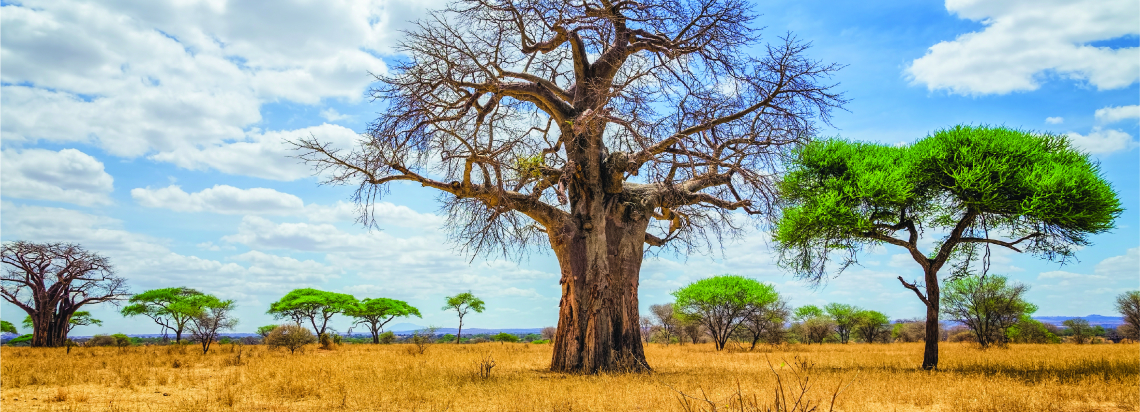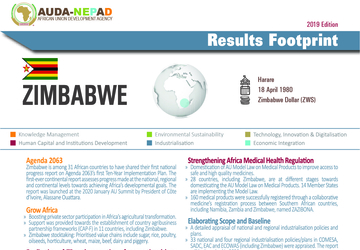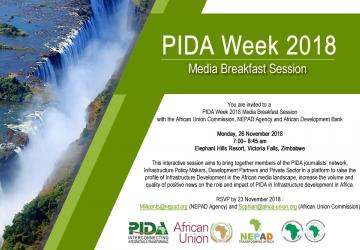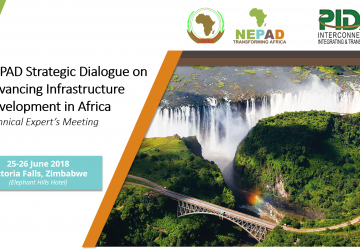 Zimbabwe
Zimbabwe
Official Name: Republic of Zimbabwe
Capital: Harare
Independence Day: 18 April 1980
Currency: Zimbabwe Dollar (ZW$)
Key Result
114 women and 35 men benefited by establishment of community gardens and training, constitution building and group formation training, craft training, product development and marketing, quality management and leadership.
Zimbabwe is among 12 other countries that have domesticated an adapted version of the continent’s first Model Law on Medical Products Regulation.
The Batoka Hydropower (DFS) is a plant based in the Zambezi River Basin, with an installed capacity of 1,600 MW, to enable the exporting of electricity.
5 manuals (training curriculum) on livestock climate change adaptation and mitigation were developed and made available for public access.
Through the TerrAfrica leveraging Fund (TLF), the country received USD 250,000 to implement the project Zimbabwe Hwange Sanyati Biological Corridor (HSBC).
Related
Projects

A critical AU Model Law aimed at harmonizing medical products regulatory systems in Africa was endorsed by African Heads of State and Government at the January 2016 AU Summit in Addis Ababa, Ethiopia. The AU Model Law will contribute towards accelerate the regulation of safe, quality and affordable medical products and technologies. Zimbabwe has embraced and domesticated the AU Model Law and is already utilizing an adapted version.
Following a successful ZAZIBONA Assessors meetings in 2015, a total of 103 products were reviewed. As a result, the ZAZIBONA Heads of Agencies (HoA) recommended a total of 28 products for registration within SADC member states. As a participating member, Zimbabwe successfully registered a total of 20 products and remains committed to the harmonization of medical products registration. The ZAZIBONA HoA also recommended 14 products for non-registration while 61 are pending. The ZAZIBONA scheme is part of the SADC Framework for Regulatory Harmonization and was endorsed by the SADC Regulators Forum. A further four (4) ZAZIBONA Assessors meetings will be held in 2016.
Zimbabwe also hosts a RECORE specialized in medicine registration and evaluation, quality assurance and/or quality control and clinical trials oversight called Medicines Control Authority of Zimbabwe (MCAZ). RCOREs are institutions with specific academic and technical regulatory science expertise and training capabilities capable of producing regulatory workforce in Africa.

The 5th Africa Day for Food Security and Nutrition was organised in Kinshasa, DRC in November 2014 under the theme ‘African Renaissance: Achieving the Right to Adequate Food and Nutrition’. Food and nutrition stakeholders from across the continent discussed the importance of sustainable diets for nutrition security in Africa. The event raised awareness among policy makers of the importance of traditional diets.
On-going technical support to strengthen the national-level knowledge management platform

CAADP Compact: Zimbabwe signed the CAADP Compact on 22 November 2013.
Capacity Building: NEPAD supported Zimbabwe in January 2015 in conducting an Independent Technical Review (ITR).

Project : TAH programme
Description : This is phase I of the continental connectivity programme that focuses on completion and standardisation of the TAH missing links by 2030
Project : Single African Sky phase 1 (design and initial implementation)
Description : Single African Sky is a continental programme that will create a high-level, satellite-based air navigation system for the African continent
Project : Yamoussoukro Decision implementation
Description : Accelerate Yamoussoukro Decision implementation by identifying countries that are ready to fully implement it, and discussing and agreeing with both their governments and airlines to launch the voluntary club on a full membership basis;
Project : ICT Enabling Environment
Description : This programme would improve the environment for the private sectors to invest in high-speed broadband infrastructure
Project : ICT Terrestrial for Connectivity
Description : This programme has two main components: secure each country connection by at least two broadband infrastructure and ensure the access to submarine cable to all landlocked countries
Project : Internet Exchange Point (IXP) programme
Description : The aim of this programme is to provide Africa with adequate internet node exchange to maximise internal traffic
Project : North–South Power Transmission Corridor
Description : 8,000 km line from Egypt through Sudan, South Sudan, Ethiopia, Kenya, Malawi, Mozambique, Zambia, Zimbabwe to South Africa
Project : Batoka Hydropower (DFS)
Description : Hydroelectric plant with a capacity of 1,600 MW to enable export of electricity
Project : North-South Multimodal Corridor
Description : This programme is designed to modernize the highest priority multimodal ARTIN corridor in Southern Africa on modern standards and facilitate travel of people and goods across the borders between South Africa, Botswana, Zimbabwe, Zambia, Malawi and DRC
Project : Beira-Nacala Multimodal Corridors
Description : Rehabilitation/reconstruction of railway and road links, including one-stop border posts along the corridors. Improvement of capacity at the ports, including capital dredging at Beira Port. Natural resources development, including Moatize Coal Field in the Zambezi Valley will use the ports as main export gateways
Project Name: Women Empowerment- Women as architects of their own future -
Africa Leadership Development Institute (LeadAfrika -Promoting Participation of Women in Decision Making and Leadership

In 2015, The NEPAD Climate Change Fund supported the Ministry of Agriculture Mechanization and Irrigation Development in Zimbabwe in implementing a project aimed at enhancing climate change adaptation capacities for small holder livestock farmers. The project’s objective was to improve capacity development outcomes, raise the awareness of climate change, contribute to knowledge management and information sharing and support climate change policy processes in Zimbabwe’s livestock industry.

ASTII project has been in operation in the country since September 2007. Accordingly, data on R&D survey core indicators was collected and published in the 2nd African Innovation Outlook (AIO-2014).
Between 2008 and 2015, a total of 52 participants, 33 of whom were female, received training on international survey methodologies (OECD).
The country signed a grant agreement of USD25,000 for surveys conducting ASTII surveys.
Contact: Eng. Willie Ganda, (wganda@emcgafrica.com; gandawd@yahoo.com) Director, Research Development and Innovation, Ministry of Higher and Tertiary Education, Science and Technology Development.
Website: http://www.mhtestd.gov.zw/

Results (2013 – 2015)
Advocacy and Strengthening of Negotiation Capacities on Post-2015 Development Agenda through the Common African Position (CAP):
• The multi-stakeholder framework of engagement specifically enhanced dialogue towards ensuring the required mass to influence the Post-2015 Global Agenda and Development Goals relevant to the Continent;
• This intervention helped strengthen country and regional level negotiating capacities for the effective incorporation and articulation of Africa’s priorities as enshrined in CAP in the final Global SDGs;
• The project enabled the participation of African stakeholders at the Means of Implementation Engagement, 3rd Financing for Development Conference and the UN General Assembly that adopted the new SDGs. This ensured the incorporation of Africa’s development priorities into the new goals through developing essential negotiation capacities;
• Through the CAP/SDGs space on the Africa Platform for Development Effectiveness (APDev), knowledge products and negotiation documents, as well as, policy briefs where successfully disseminated to the African negotiators in New York and kept the continent’s stakeholders informed of the overall process;
• Development and dissemination of post-2015 Policy Briefs on “Financing and Partnerships” and “Structural Economic Transformation and Inclusive Growth”. These are priorities outlined in the CAP and the policy briefs where utilized in the negotiation process for the African continent.
Global Partnership for Effective Development Cooperation (GPEDC):
• Africa secured the hosting of the 2nd High Level Meeting (HLM) of the Global Partnership. This was attained through robust negotiation and facilitating a common voice from Africa with regards to this critical engagement by the NEPAD Agency. The 2nd HLM will be held in Nairobi Kenya;
• The NEPAD Agency advocated for the full inclusion and participation of Africa’s Regional Economic Communities (RECs) in conducting the 2nd GP Monitoring Exercise. This was a fundamental achievement considering the RECs are the continent’s building blocks with regards to socio-economic transformation;
• The Africa Action Plan on Development Effectiveness (AAP) was granted the status of an official Global Partnership Initiative (GPI) at the Planning Meeting in Brussels. The AAP was developed by the NEPAD Agency in consultation with African multi stakeholders. This has enabled the Agency to successfully mobilize resources towards the implementation of the AAP.

Project : Hydro – Batoka Gorge Hydropower Project
Countries/Region : Zimbabwe, Zambia | Southern Africa region
Project Location : Zambezi River Basin, between Victoria Falls and the Kariba Dam
Sector/Subsector : Energy/Generation
Project Description : A hydropower plant based in the Zambezi River Basin, with an installed capacity of 1,600 MW, to enable export of electricity.
Project : Transmission-- North South Transmission Line Project
Countries/Region : Egypt, Sudan, South Sudan, Ethiopia, Kenya, Uganda, Tanzania, Malawi,Mozambique, Zambia, Zimbabwe, South Africa, | East and Southern Africa
Project Location : Regional Interconnector-East and Southern Africa
Sector/Subsector : Energy/Transmission
Project Description : Construction of an 8,000 km, 3,000 - 17,000 MW capacity transmission line system from Egypt through Sudan, South Sudan, Ethiopia, Kenya, Uganda, Tanzania, Malawi, Mozambique, Zambia, and Zimbabwe to South Africa, connecting the Eastern Africa Power Pool (EAPP) and the SAPP.

Project : North-South Corridor Road/Rail Project
Description : Construction of a multi-modal trans-continental interconnector
Description : The use of political gravitas and goodwill to unblock and facilitate political bottlenecks affecting the implementation of ICT broadband and optic fibre projects on the continent


Zimbabwe joined the TerrAfrica platform in 2015. Through the TerrAfrica leveraging Fund (TLF), support ($250,000) has been provided to the project “Zimbabwe Hwange Sanyati Biological Corridor (HSBC)”. The objective was to provide specialized assistance for the project investment in sustainable land and water management.
you agree to the AUDA-NEPAD Privacy Policy.







